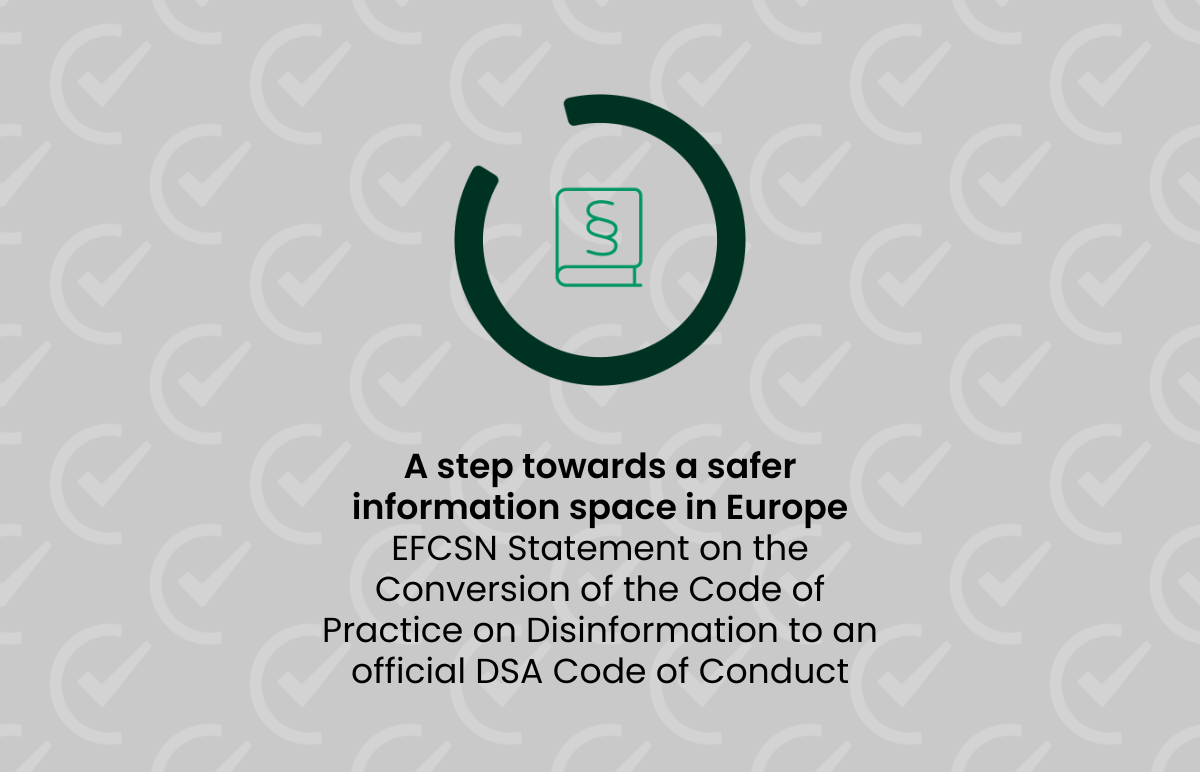
EFCSN Statement on the Conversion of the Code of Practice on Disinformation to an official DSA Code of Conduct
- The EFCSN welcomes the conversion of the EU Code of Practice on Disinformation to a DSA Code of Conduct. It is a step toward a safer information space in Europe.
- The EFCSN remains concerned that some relevant platforms have not yet signed the Code or have withdrawn from important commitments.
- The European Commission and the European Board for Digital Services have both emphasized the importance of fact-checking in their opinion on the conversion.
13 February 2025 – The European Fact-Checking Standards Network (EFCSN) welcomes the conversion of the EU Code of Practice on Disinformation to a Digital Services Act (DSA) Code of Conduct. It remains disappointing that many of the biggest online platforms (VLOPs) have decided not to commit to the fact-checking chapter within the Code, but the EFCSN regards the Code as the benchmark for determining the extent of compliance with the DSA. Clara Jiménez Cruz, Chair of the EFCSN, considers the Code conversion “a strong signal that the EU is committed to enforcing its laws despite threats and pressures from abroad, but the actual enforcement is key to evaluate if the Code’s objectives are met”.
The EFCSN remains concerned that major platforms have not signed the Code at all while other big technology companies have withdrawn from important commitments to protect European citizens from misinformation and disinformation. Signing just a few commitments that are easy for platforms to meet is not enough in the fight for information integrity, because, as the European Commission’s opinion states, “the Code constitutes a set of interlinked Commitments that support each other, and it is therefore most effective when fully implemented by the signatories”.
Fact-checking is an essential part of reducing the harms of misinformation, which Executive Vice-President Henna Virkkunen has also highlighted in her opinion. “Independent, impartial fact-checking can significantly contribute to identifying and addressing risks linked with the dissemination of disinformation, negative effects on civic discourse, and electoral integrity while fully respecting freedom of expression.”
In particular, the EFCSN emphasizes the importance of fact-checking by professional, independent fact-checkers, as the European Board for Digital Services similarly affirmed in its comments on the conversion. “As regards fact-checking, the Board notes that, as set out further above, it considers it an effective instrument to address disinformation and encourages VLOPs and VLOSEs signatories to apply a multi-layered approach by including such third-party input and not only rely on automatic detection, recommender systems or user reporting tools.”
The conversion of the Code brings legal strength to the initiative and the EFCSN is hopeful that it will mark a step forward in the promotion of a better online space for citizens across Europe. “The Code of Practice on Disinformation can serve as a significant and meaningful benchmark of DSA compliance for the providers of VLOPs and VLOSEs that adhere to and comply with its Commitments. This benchmark can play an important role in supporting the enforcement of the DSA in the area of disinformation,” as the Commission’s opinion states. Looking ahead, the EFCSN calls on platforms to engage and for regulators in Europe to use the gained strength of the Code in this mission.
About the Code of Practice on Disinformation
EU Code of Practice (“the Code”) on Disinformation is a framework for online platforms to guide and monitor their commitments towards combating disinformation. It is comprehensive and contains 128 specific measures, such as the integration of fact-checking into platforms. For signatories designated as Very Large Online Platforms (VLOPs) or Very Large Online Search Engines (VLOSEs), engagement with the Code is as well relevant under the scope of the Digital Services Act (DSA) as the Code will be converted into a Code of Conduct. Notably, even though platforms voluntarily sign up to the Code and can unsubscribe from certain commitments, it will be used as a benchmark for measuring compliance with the DSA, both for signatories and non-signatories.
About the EFCSN
The European Fact-Checking Standards Network represents almost 60 fact-checking organizations across Europe who commit to the standards of independence, transparency, and journalistic quality outlined in the European Code of Standards for Independent Fact-Checking Organisations. The EFCSN is also a signatory of the Code of Practice.